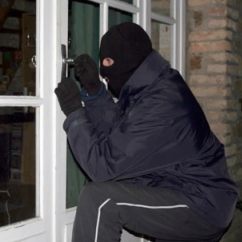Articles and News
Always Worth A Reminder: Security Tips For Jewelers At Home July 03, 2013 (0 comments)

Merrick, NY—Following a recent large increase in the number of jewelers kidnapped at home and brought back to their stores for a robbery, Jewelers' Security Alliance reminds jewelers that it is necessary to take serious security measures to discourage a home invasion or kidnapping before it starts. The Centurion Newsletter believes it’s never too often to repeat JSA’s excellent advice.
Crimes at the homes of jewelers stand as a frightening reminder that security for the jewelry industry is a 24-hour-a-day, seven-day-a-week job. When a jeweler finishes his or her business day, and locks the store, office or manufacturing facility, the need for careful security does not stop. By studying cases over many years, JSA has developed a series of security recommendations for jewelers to follow at home:
1. Casing. Attacks on jewelers' homes are preceded by some form of casing, in which the criminals follow a jeweler, stake out his home or business, and try to find out information about him, his patterns and his family. All jewelers should be careful at all times to see if they are being watched or followed. Are people sitting in a car near your home or business for too long? Is a car following you when you leave the store? Do you have suspicious phone calls or suspicious "customers" visiting your store? The best opportunity for stopping a home invasion is to spot suspects during the casing period and to call the police.
2. Vary route. Vary your route and time of travel to and from work. Be alert to people following or watching you. To determine if you are being followed, drive very slowly and observe if any vehicles are hanging back and unwilling to pass you.
3. Suspicious incident logbook. Many jewelers have found it helpful to keep a suspicious incident logbook at their business premises in which all employees can record things that appear to be "not quite right." This should also be done at home. The log can be used to write down details such as license plate numbers, names used, time, physical description and other information regarding suspicious incidents that may later be helpful to police.
4. Training family members. Even the youngest family member in your household needs some instruction about the dangers of the jewelry business and how they must cooperate. Family members should be trained not to give out information on the phone, not to open the door to unknown people, to be extremely careful regarding delivery personnel, and to watch for suspicious people watching the house. Even temporary visitors, such as an in-law or babysitter, need specific instructions.
5. Physical security at home. Security features should be a very important factor in selecting the residence in which you choose to live. Jewelers should evaluate such issues as a dead-end vs. heavily traveled street, the closeness of neighbors, and the garage or parking set-up. Other issues of physical security must also be given careful consideration, such as having proper locks, an alarm system and good lighting. There are jewelers who highly recommend a dog at home for warning and protection.
6. No large safe or jewelry merchandise at home. Never keep jewelry merchandise or a large safe at home. Personal jewelry may be kept in a small, concealed safe in a floor or wall. Consider keeping valuable personal jewelry in a bank safe deposit box when not being used.
7. Trusted neighbors. Whether near your home or business, trusted neighbors can provide additional eyes for spotting suspicious behavior by those casing you. Discuss with trusted neighbors your special risks as a jeweler and enlist their help.
8. Household help. Every household worker who comes into your home puts you at greater risk. Cleaning ladies, lawn help, babysitters, painting and remodeling people, and a long list of workers with access and knowledge of your household all pose some risk. Even if they are honest themselves, they may have boyfriends, spouses, relatives or friends who are criminals, or they may unintentionally provide information to those who then target you. You must screen, monitor and supervise all household help very carefully. In the case of a nanny or someone with close contact with your household, or in the case of someone who lives with you, a background investigation of that person is suggested.
9. Telephone. Have an unlisted and unpublished home phone number. Keep a charged cell phone with you at all times, including at your bedside at night.
10. Social networks. Do not put personal information about your home, family members and such things as vacations on social networking sites. (Editor’s note: Make sure your children and teens also understand the need to be very careful about their social media posts.)
11. Car panic alarm. Some jewelers keep their car keys next to their bed so that they can hit the remote panic alarm of their car to help scare off intruders at the first hint of trouble.
12. Establish contact with your local police department. Before any problem develops, contact your local police department and get to know someone in a supervisory position. Explain to the supervisor or chief the special crime risks of jewelers so that if you do have a problem, you will be calling someone you know.
13. Security code phrase. Jewelers should consider having a family security code phrase that can be used to alert a family member on the phone to a crime problem. The code phrase must not raise the suspicions of criminals holding the jeweler or family hostage.
Assume criminal gangs will use any means, including violence, to carry out a home invasion and robbery. If a jeweler is a victim of a kidnapping/robbery, the jeweler and all family members and others involved should cooperate fully with the criminals or risk violence.
Top image: xpressprotection.com







